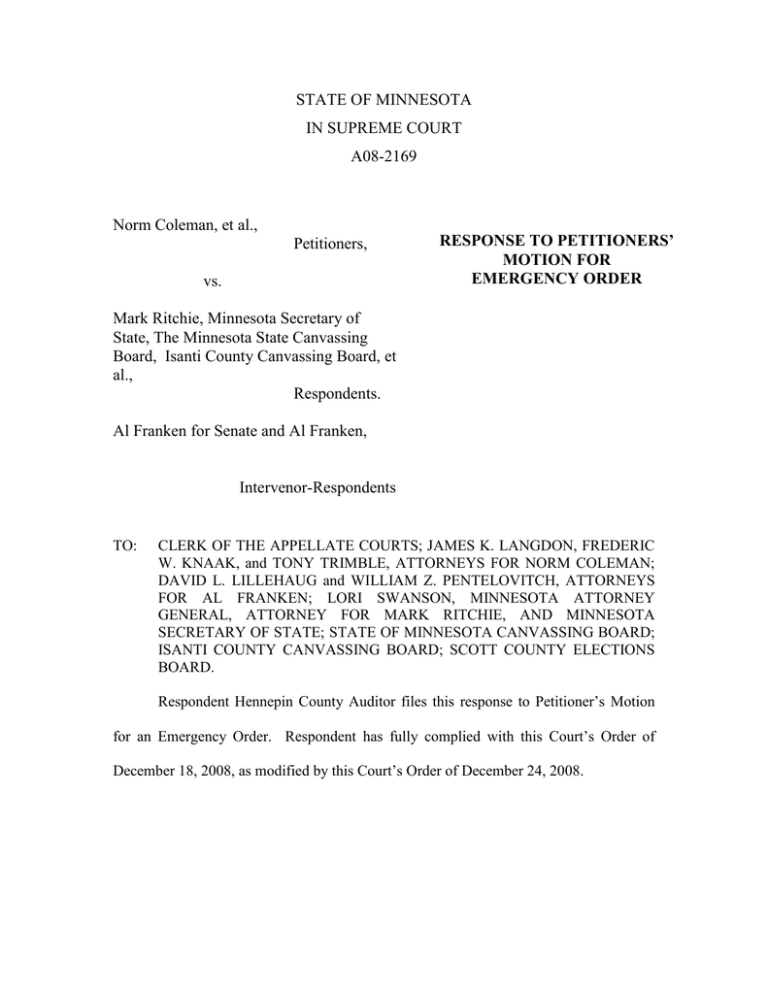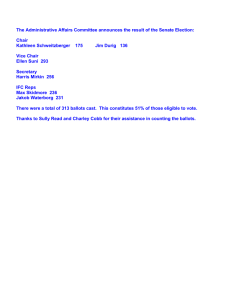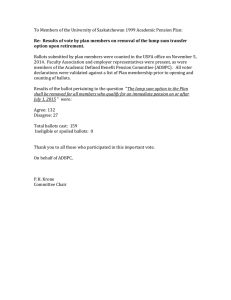STATE OF MINNESOTA IN SUPREME COURT A08-2169
advertisement

STATE OF MINNESOTA IN SUPREME COURT A08-2169 Norm Coleman, et al., Petitioners, vs. RESPONSE TO PETITIONERS’ MOTION FOR EMERGENCY ORDER Mark Ritchie, Minnesota Secretary of State, The Minnesota State Canvassing Board, Isanti County Canvassing Board, et al., Respondents. Al Franken for Senate and Al Franken, Intervenor-Respondents TO: CLERK OF THE APPELLATE COURTS; JAMES K. LANGDON, FREDERIC W. KNAAK, and TONY TRIMBLE, ATTORNEYS FOR NORM COLEMAN; DAVID L. LILLEHAUG and WILLIAM Z. PENTELOVITCH, ATTORNEYS FOR AL FRANKEN; LORI SWANSON, MINNESOTA ATTORNEY GENERAL, ATTORNEY FOR MARK RITCHIE, AND MINNESOTA SECRETARY OF STATE; STATE OF MINNESOTA CANVASSING BOARD; ISANTI COUNTY CANVASSING BOARD; SCOTT COUNTY ELECTIONS BOARD. Respondent Hennepin County Auditor files this response to Petitioner’s Motion for an Emergency Order. Respondent has fully complied with this Court’s Order of December 18, 2008, as modified by this Court’s Order of December 24, 2008. A. Background. After briefing and argument relating to the issue of erroneously rejected absentee ballots, on December 18, 2008, this Court issued an Order. The Order directed “local election officials” to “identify for the candidates review those previously rejected absentee ballot envelopes that were not rejected on any of the four bases stated in Minn. Stat. §203B.12 (2006), or in Minn. Stat. §203B.24 (2006) for overseas ballots.” Order of December 18 at 3.1 This Court’s Order goes on to say that “Any absentee ballots so identified that the local election officials and the candidates agree were rejected in error” shall be opened and the ballot counted. The Hennepin County Auditor requested local election officials in Hennepin County to comply with this Court’s Order by identifying for the candidate’s review those previously rejected absentee ballots that were not rejected on any of the four statutory bases. Local election officials identified 329 such ballots. 2 Recognizing that the Court’s Order, by its terms, only authorized review of ballots local election officials identified as erroneously rejected, but also wishing to promote the spirit of cooperation contemplated by this Court’s Order, the Hennepin County Auditor agreed to reconsider its position on “extra” ballots the campaigns identified, but only if both campaigns could themselves agree the “extra” absentee ballots were erroneously rejected. The campaigns each identified ballots they wished to have local election officials reconsider. The Franken Campaign identified approximately 30 such ballots. The December 18, 2008, Order was modified by an Order of December 24, 2008, but was not changed in any respect herein material. 2 The factual portion of this response rests largely upon the attached affidavit of Jill Alverson, the Hennepin County Auditor. 1 For example, the Franken campaign identified several absentee ballots from the City of Bloomington that had been rejected because the signature on it did not match the signature on the absentee ballot application. Bloomington election officials, in contrast, concluded the signatures were not genuine and rejected the ballot for one of the four valid statutory reasons. See Minn. Stat. §203B.12 (1). The Franken campaign urged reconsideration based on a “declaration” presumably signed by the voter that the signature was indeed genuine and met the statutory requirements. The Coleman campaign identified 170 such ballots and delivered a spreadsheet purporting to identify them on Monday December 29, 2008 at about 4:45 p.m. The Coleman campaign list did not specify reasons why they believe ballots should be reconsidered.3 On Wednesday, December 31, 2008, at 11:00 a.m., the Hennepin County Auditor met with representatives of the Franken and Coleman campaigns for the purpose of identifying which absentee ballots all could agree were erroneously rejected. At the outset of the meeting, the Auditor inquired of the Franken and Coleman campaigns whether they had been able to agree that any of the 30 reconsideration ballots identified by the Franken campaign were rejected in error and could be counted. The campaigns indicated they had not reached any such agreement. The Auditor similarly inquired of the Franken and Coleman campaigns whether they had been able to agree that any of the 170 reconsideration ballots identified by the Coleman campaign had been rejected in It may be that many of the reconsideration ballots the Coleman campaign identified, involve signature issues, both campaigns received through data practices request responses from all of the cities in Hennepin County, photocopies of both the absentee ballot applications and absentee return envelopes. Thus, the campaigns had in their possession the information on which to make and evaluate such a challenge. 3 error and could be counted. The campaigns indicated they had not reached any such agreement. The Auditor indicated that she stood ready to consider any such ballots. Thereafter, the Auditor indicated the process of reviewing the ballots identified by local election officials in Hennepin County as wrongly rejected would commence. The process was open to the public and lasted from about 11:15 a.m. until 4:45 p.m. and from 9:00 a.m. until approximately 11:30 on Friday, January 2, 2009 The process proceeded one ballot at a time. The campaign representatives first indicated whether they believed the ballot listed on a spread sheet should be accepted or would require more information. Those ballots the campaign representative both agreed should be accepted, were placed in a box to be forwarded to the Secretary of State to be open and counted. For those requiring more information, the campaign representatives were informed of the reason local election officials believed the ballot was rejected in error and were shown the absentee ballot envelops at issue and any other materials that could be located relating to the ballots. The campaign representatives were asked to either accept the ballot or to sign a form indicating for which of the four statutory reasons the representative believed the ballot was properly rejected. Ballots which were accepted were then added to the box of ballots to be forwarded to the Secretary of State for counting. Rejected ballots were retained and preserved. By the end of the process all 329 ballots identified by local election officials as erroneously rejected were reviewed. 255 were accepted by both campaigns. The Coleman campaign objected to 34 ballots. The Franken campaign objected to 37. Hennepin County removed four ballots because the individual voted on election day and one ballot that was a Presidential ballot. According to this Court’s Order of December 24, 2008, the accepted ballots must be forwarded to the Secretary of State’s Office by January 2, 2008. B. Response to Motion. By its terms, this Court’s Order directed “local election officials” to “identify for the campaigns’ review those previously rejected absentee ballot envelopes that were not rejected on any of the four bases stated in Minn. Stat. §203B.12 (2006), or in Minn. Stat. §203B.24 (2006) for overseas ballots.” Order of December 18 at 3. The Court’s Order further directs the parties to seek an agreement on “any absentee ballots so identified.” Id. That is exactly what the Hennepin County Auditor did. Local election officials within Hennepin County reviewed each rejected absentee ballot and determined that 329 were rejected in error. Local election officials determined the remaining absentee ballots were properly rejected for one of the four statutory reasons. Local election officials in Hennepin County timely provided the campaigns with a spreadsheet listing the 329 ballots and the reasons why the election officials believed the ballots were rejected in error. The Coleman motion asserts that counties are now implementing the Court’s Order in a disparate manner because some agreed to reconsider additional ballots identified by the campaigns, which were not identified by the local election officials as improperly rejected. The fact that campaign representatives were successful or unsuccessful in convincing local election officials to reconsider does not, however, change the fact that this Court established a uniform standard for determining which ballots could be forwarded to the Secretary of State for counting. Those ballots must be identified by local election officials as rejected in error and the campaigns must agree with that assessment. In other words, only ballots which the local officials and the two campaigns agree were rejected in error will be passed on to the Secretary of State’s Office. In Hennepin County, that number turned out to be 255. Whether local elections officials were convinced to add a ballot to the consideration list or elected to stand upon their initial judgment unless the campaigns both agreed to the contrary, this Court’s Order was fully complied with. Nothing local election officials did in any way suggests the extraordinary relief Petitioner seeks is warranted under this Court’s Order or in order to secure equal protection of the laws. In addition, local election officials have finished the reviews this Court ordered. There is nothing to be gained and much to be lost by an order scrapping the hard and careful work of local election officials conducted pursuant to this Court’s Order in favor of review which eliminates local election officials from the process and would presumably allow the campaigns and the Secretary of State to approach the task of review de novo. Finally, as a practical matter, Hennepin County has delegated authority to conduct elections to 45 cities in the County. Those cities retain the ballot materials. Immediately upon receiving this Court’s December 18, 2008 Order, the Hennepin County Auditor began assembling the materials necessary for the campaigns to review each of the 329 ballots local election officials identified. It would be a practical impossibility to obtain from cities the 200 ballots and related materials Petitioners request and to forward them in time for the ballots to be reviewed, opened, and counted by the January 4, 2009, deadline set forth in this Court’s Order of December 24, 2008. CONCLUSION In accordance with the foregoing, Respondent, Hennepin County Auditor, respectfully requests this Court to deny Petitioner’s Motion for An Emergency Order. Respectfully submitted: s/ Patrick S. Diamond (#0175110) MICHAEL O. FREEMAN (#31860) Hennepin County Attorney C-2000 Government Center 300 South Sixth Street Minneapolis, MN 55487 Telephone: (612) 348-5550 ATTORNEYS FOR HENNEPIN COUNTY AUDITOR

